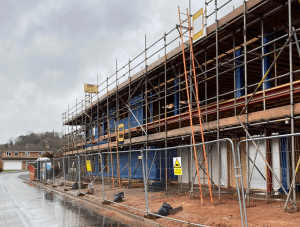SIPS vs. Traditional Construction
Posted Tuesday 23 April, 2024 in
StoriesIn today’s dynamic architectural landscape, the choice of building materials and techniques plays a pivotal role in shaping sustainable, efficient, and aesthetically pleasing buildings.
In this article, we hope to help explain the differences between Structural Insulated Panel Systems (SIPS) construction and traditional building methods. As advocates for both innovation and time-tested practices, we aim to explore the strengths, nuances, and considerations of each approach, guiding you towards informed decisions for your architectural endeavours.
Each project is different, from site-specific factors to each individual design. Project considerations will play a major role in informing the best construction method for you and your ambitions.
Contact us today to speak to one of our advisors and start your journey – 01746 768191

Photo taken during a site inspection of one of our designer homes built using SIPS Construction.
SIPs Construction:
Pros:
- Quick Construction: SIPs are prefabricated off-site, which can significantly reduce construction time compared to traditional methods. This can lead to cost savings and faster project completion.
- Energy Efficiency: SIPs offer excellent thermal performance due to their high insulation value, resulting in reduced energy consumption for heating and cooling throughout the year.
- Strength and Structural Integrity: SIPs provide strong structural support and can withstand extreme weather conditions. SIPs offer a compelling solution for areas where land stability is a concern. Their lightweight nature reduces the load on the foundation and minimizes stress on the soil, particularly beneficial in regions prone to subsidence or soil movement. Providing consistent structural integrity throughout the building envelope, SIPs mitigate the risk of differential settlement or uneven stress on the foundation, crucial for areas with unstable soil conditions. Prefabricated off-site to precise specifications, SIPs minimize disturbance to the land, preserving its natural stability.
- Minimal Thermal Bridging: SIPs construction minimizes thermal bridging, which can lead to more consistent indoor temperatures and increased comfort for occupants.
- Design Flexibility: SIPs can be customized to accommodate various architectural designs and styles, including contemporary dwellings with large glass panels, offering flexibility in construction and aesthetic options.
Cons:
- Limited Modification: Once assembled, SIPs are difficult to modify or alter, so any design changes must be carefully planned in advance.
- Transportation Challenges: Transporting large SIPs panels to the construction site can be logistically challenging, especially in rural areas like Shropshire. The SIPS company will need to visit site before fixing any fee quote to ensure the SIPS can be delivered to site and plan for the vehicles/tools they will need that work with your site.
- Moisture Control: Proper installation and sealing are crucial to prevent moisture infiltration, as any water intrusion can lead to mould or structural damage over time.
- Cost: While SIPs can lead to long-term energy savings, the initial cost of materials and specialized labor may be higher compared to traditional construction methods.
Traditional Construction:
Pros:
- Widely Available Materials: Traditional construction methods utilize readily available materials such as bricks, timber, and concrete.
- Customization and Flexibility: Traditional construction allows for greater flexibility in design changes during the construction process, making it easier to adapt to evolving client preferences or site conditions.
- Proven Method: Traditional construction techniques have been used for centuries and are well understood by builders and craftsmen, reducing the risk of errors or unforeseen challenges during construction.
- Repair and Maintenance: Traditional materials are generally easier to repair or replace compared to SIPs, offering greater flexibility for future renovations or updates.
Cons:
- Insulation Performance: Traditional construction methods typically offer lower insulation values compared to SIPs, leading to potentially higher energy consumption and operating costs over time.
- Construction Time: Traditional construction methods may take longer to complete compared to SIPs due to on-site assembly and curing times for materials like concrete or mortar.
- Labor Intensive: Traditional construction often requires skilled labor for tasks such as bricklaying or carpentry, which can contribute to higher labor costs and potential skill shortages in certain regions.
- Thermal Bridging: Traditional construction materials like timber or steel can result in thermal bridging, leading to heat loss and potential condensation issues if not properly addressed.
Conclusion:
In conclusion, the choice between SIPs and traditional construction methods hinges on various factors, each offering distinct advantages and considerations. While traditional construction provides flexibility for incorporating large glass panels and accommodating modifications, SIPs excel in quick assembly, energy efficiency, and structural integrity, particularly in areas with land stability concerns like Shropshire. However, for those seeking a balance between aesthetics and efficiency, a hybrid approach integrating both methods could be a viable solution.
For Shropshire architects and those in the West Midlands seeking tailored solutions for designer homes, understanding the nuances of each construction method is crucial. By consulting with experienced residential architects familiar with the local landscape and construction challenges, you can navigate the complexities of building projects with confidence and efficiency.
For further insights and expert guidance tailored to your architectural ambitions, don’t hesitate to contact us by email or at 01746 768191.
For additional resources and in-depth analysis on SIPs construction, we recommend exploring this informative article by Home Building Magazine.